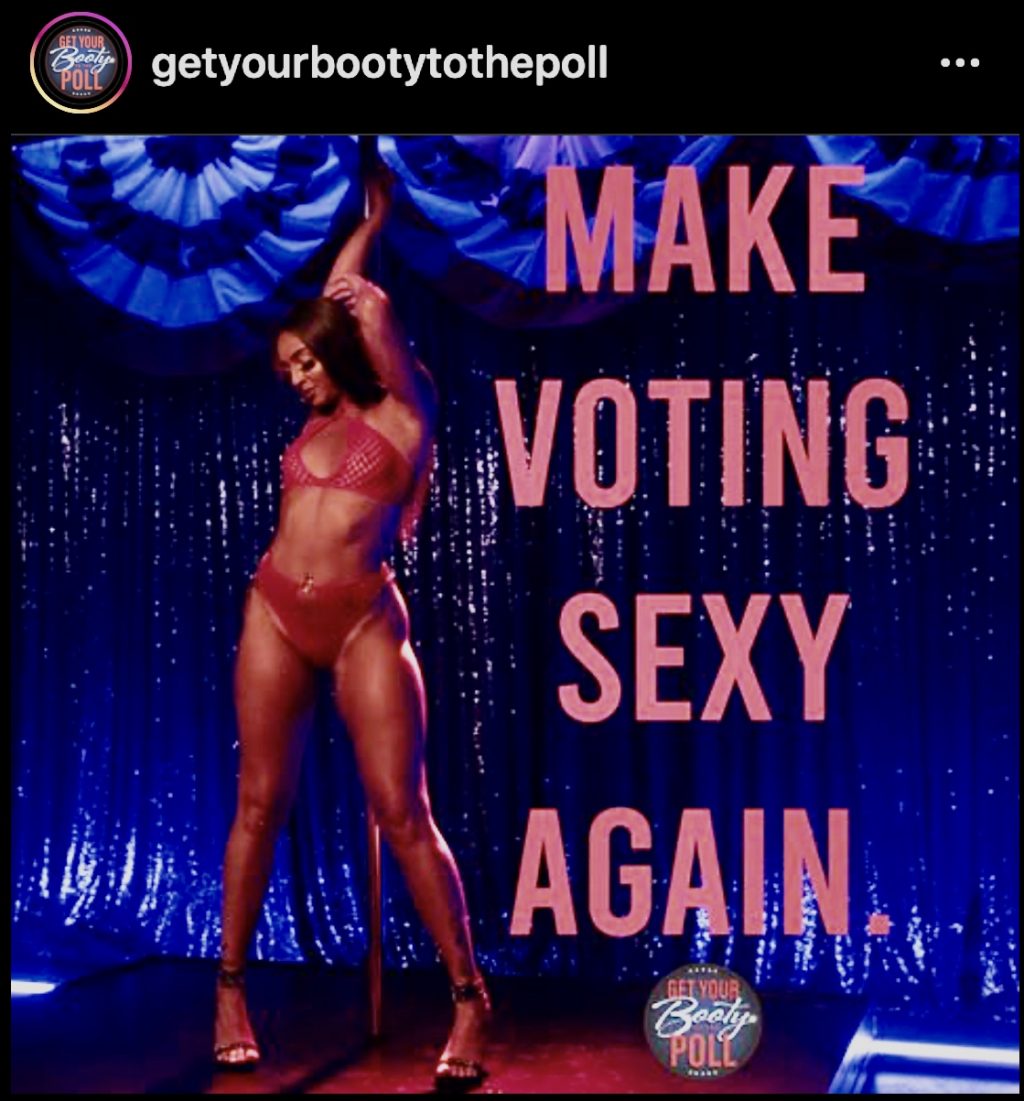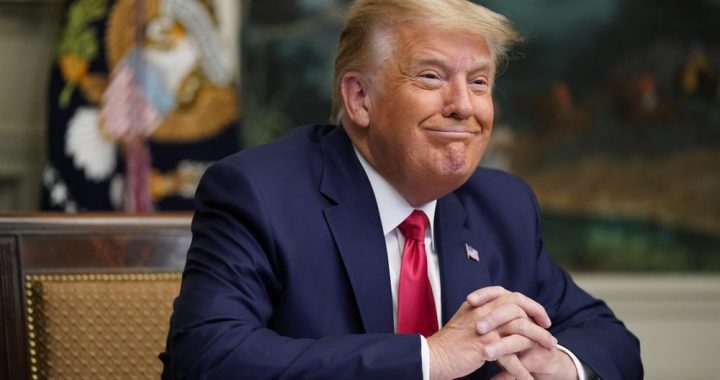
Atlanta Strippers Say “Get Your Booty to the Polls”
Strippers are pushing you to vote in a new ad aimed at convincing Black men to vote.
The ad, which has been viewed nearly 3 million times on Twitter and YouTube, is nonpartisan and focuses on the importance of down-ballot races.
The ad campaign, which is called “Get Your Booty to the Poll,” uses the cultural influence of strippers and moves it into political power. “We kind of determine what is hot and what’s not,” Coy Malone, who was a pole dancer at Atlanta’s legendary Magic City strip club until it was shut down shortly after the pandemic was declared.
“A lot of the stuff that you see has been influenced by strip club culture, and especially Atlanta strip club culture. If you’ve heard a song that is very popular on the radio or is very hot, 9 times out of 10 we’ve heard it in the strip club like six months before everyone else,” said Malone. “If we like it, everybody else likes it,” she said.
The ad comes as the Joe Biden campaign is reportedly concerned about his ability to win over Black men, a demographic seen as key to winning the presidential election.
Black voters typically favor Democrats by large margins, and a recent poll of likely voters showed that 83% of Black respondents favored Biden while just 10% preferred Donald Trump. While Black women are sometimes referred to as the “backbone” of the Democratic Party, Black men were less likely to vote in 2016, and among those who did, 14% voted for Donald Trump. Biden was able to win the Democratic primary with overwhelming support from older Black voters in the South, but he has been plagued by his sponsorship of the 1994 crime bill, which resulted in mass incarceration for Black communities.
Biden has also faced criticism for more recent comments. “If you have a problem figuring out whether you’re for me or Trump — then you ain’t Black!” he said during an interview with Charlamagne tha God on The Breakfast Club. Biden was also criticized for comments in August when he contrasted Black voters with Hispanic ones, saying that the Black community was less diverse.
A summer of protests against police violence and systemic anti-Black racism has placed renewed importance on state and local elections, where much of the decision-making power on issues like police reform resides.
“You know it’s more than just the president on the ballot, right?” asks a dancer named Nikki in the ad.
“A district attorney decides who to prosecute,” says another dancer named Imani. “Can’t make it rain if you’re locked up on some bullshit.”
Malone told BuzzFeed News: “People felt like their vote — mostly Black people that I was having conversations with — felt like their votes were not gonna be counted. They felt like they were not represented, that whatever was going on in government, that whatever was on the table, whatever was being considered, whatever was being put into place had nothing to do with them. … This has been the Black experience for many elections.”
“I just kept letting people know, like, hey, do you know it’s not just about voting for the president? … The DA, the judges, the sheriff. You can still vote on taxes; you can still vote on laws. These are things that are on the ballot that you decide,” she said.
Many strippers and strip clubs have faced additional difficulties during the pandemic because of restrictions on federal relief funds that prohibited money from going to organizations or individuals engaged in activities “of a prurient sexual nature.”
Malone, who has been working as a dancer for about seven years, said the shutdown has given her time to focus on building her business as a vegan chef. She said she has been criticized for speaking up before with people saying things like “you’re nothing but a stripper, nothing but a pole dancer.” But she said she’s tired of arguing about politics online and saw the ad as an opportunity to have a bigger impact.
“I was interested because I was already having these conversations on Facebook and Instagram and in person with people about voting,” said Malone. “And I felt like if I just do something like this, creative, it will give me a chance to share this message … instead of having these long conversations and sometimes arguments and sometimes debates about voting and why it’s important.”
Current and former sex workers have gotten involved in the election in other ways, too. Biden sat down for an interview with rapper and former stripper Cardi B in August. And porn company Brazzers has its own get-out-the-vote campaign called #StrokeTheVote. A spokesperson told BuzzFeed News that Brazzers would be shut down from 5 p.m. to 8 p.m. in each time zone on Election Day in order to encourage people to go vote.
The “Get Your Booty to the Poll” ad has garnered both accolades and criticism for its message and for featuring sex workers as a tactic to get Black men’s attention.
Jasmine Johnson, a porn performer, educator, and therapist who goes by the performer name Jet Setting Jasmine, has been organizing political education panels for sex workers of color through the organization BIPOC Adult Industry Collective, which was founded this summer. She said it was refreshing to see sex workers speaking up.
“It is really awesome because it’s controversial, just as sex workers are,” said Johnson. “Objectification of Black women’s bodies has certainly been used in a way to oppress us, in a way to stereotypes us, and in a way to cause harm — but if they’re autonomous in making that decision, they are now taking that same objectification and actually utilizing it to empower others, to get people’s attention on their own terms.”
Other sex workers were less enthusiastic, saying that Black people should not be held responsible for fixing the country’s problems. “That shit annoys me. It does not get to the root of the problem,” said MF Akynos, a stripper and founder of the Black Sex Workers Collective. “I’m not saying don’t vote — but I’m saying when they’re pushing to vote, it’s so rooted in fucking racism.”
“If they don’t vote, they bring it back to the marginalized group, primarily Black people, and act like we’re at fault for this…There are a lot of underlying issues that are not being addressed.”
The ad has also been criticized as condescending to the very demographic that it seeks to persuade, with some detractors wrongly speculating that it was the product of out-of-touch white Democrats.
The ad was actually conceived of by Angela Barnes, a Black director based in Atlanta. Barnes, who was out of work because of the pandemic, wanted to say something in the aftermath of the killing of George Floyd in police custody, but she didn’t feel comfortable attending protests because she doesn’t like crowds.
“I couldn’t just stay at home,” Barnes said. “I needed to do something because my children’s lives — it feels like my children’s lives are in danger…They’re Black boys in a country that has no values for Black men, so I don’t want them to grow up in a country that doesn’t serve them.”
Barnes worked with producer Paul Fox and an organization called the Black Male Voter Project to craft the ad’s message. Mondale Robinson, the political director at Democracy for America and founder of the Black Male Voter Project, consulted with the producers and dancers on the tone and content of the ad. Robinson said he drew on information that the organization had gathered from a program called Brothas Be Voting, which has engaged in discussions with roughly 4,000 Black men across the country who have never or rarely voted.
Robinson acknowledged the limitations of the standard get-out-the-vote message, saying that simply asking why Black men don’t vote is placing responsibility on the wrong party. “People are sporadic voters not because they’re lazy or whatever, they’re sporadic voters because we don’t invest in them. We have to acknowledge that voting is a habit that’s created by resources spent on it,” he said.
Robinson said many Black men do not feel invested in the presidential election because they don’t see the potential for change, but said that emphasizing the direct impact of local elections on specific issues could motivate people to participate.
“National elections aren’t going to motivate Black men…The normal response is gonna be if you ask a Black man about the national election, their life isn’t going to change under any president — not Barack Obama, and not Trump,” said Robinson. “What I know is if people are excited about local elections, they’re going to go to the poll and vote the entire ticket.”
Barnes said she came up with the idea to work with pole dancers because she wanted Atlanta culture to feature prominently, and she recognized she would need to generate attention in order to fund the ad, which was supported through a GoFundMe campaign.
“Our bank accounts were not backed by anybody. We’re not sponsored by anybody, so when we were brainstorming, I said we need something that’s not just informational; we need something that they’re going to want to share on their own,” said Barnes.
Barnes said highlighting the strip clubs made sense because of their cultural influence. “I felt like strip club culture in Atlanta is part of the Atlanta culture. It’s very specific to Atlanta, even if you’re not a strip club kind of person. People have dates there, weddings and funerals there. Even when COVID shut [it] down, Magic City kitchen still stayed open,” said Barnes.
Barnes said she felt most of the criticism was a misunderstanding and based on an assumption that all Black voters are alike.
“This video was one way to reach one segment of Black men out there. It was not ever intended to be the only way to reach all Black men. That would be ridiculous. Black people are not a monolith,” said Barnes. She acknowledged that as a Black person, “You get stereotyped all the time. I get why people were upset. … but that’s not what it is.”
“For me,” she said, “Black lives matter. And that’s not just the respectable Black lives — it’s all Black lives. Rich Black lives, poor Black lives, LGBT Black lives, exotic dancer Black lives, convicted felon Black lives. They all matter. You can’t pick and choose.”







